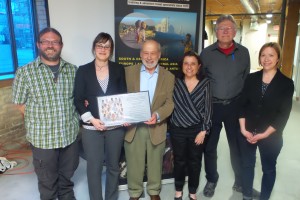Do Your Homework When Trekking
Kenneth MacDonald is asking people to take the high road when seeking high ground.
MacDonald, with the University of Toronto’s geography department and whose climbing history has seen him reach a lofty 26,000 feet, told a World Expeditions symposium on sustainable travel in Toronto yesterday (April 19) that both climbers and trekkers heading for hinterland regions should keep the welfare of the porters who accompany trekking and climbing groups in mind.
The blunt-speaking MacDonald, who has lived in Pakistan and climbed in the Himalayas, said the conditions that porters working in that mountain range and others often “basically constitute an outdoor sweat shop,” with companies that host Western adventurers often eager to cut costs by underpaying staff.
MacDonald underlined several issues that porters often must contend with, including poor equipment, with porters sometimes having to sleep under tarpaulins and on “blankets on bare ice,” while those they’re accompanying in turn will be staying in “four seasons mountain tents.”
He also stated that a porter with “plastic shoes on his feet” might not receive adequate nutrition, which can lead to muscular and cellular decay and help shear as many as 20 years off his life.
Porters often struggle under massive loads that can lead to spinal deformities, he continued, adding that in impoverished northern Pakistan some four to 10 porters die annually because of poor working conditions.
“That’s a significant price to pay when you’re trying to provide for your family… These are men who are doing work they don’t necessarily want to do.”
MacDonald, who has explored numerous other parts of the world, including Peru and Papua New Guinea, said there are often government regulations aimed at safeguarding the rights of porters, but those regulations may not be enforced in developing countries.
The Alpine Club of Pakistan, for instance, is the de facto overseer of climbing in northern Pakistan, but the membership is often made up of climbing outfitters who have a financial stake in keeping employee salaries low.
MacDonald believes that people should continue trekking and climbing in remote areas, but cautioned that those going on those types of expeditions should first learn about the company they’re considering and be wary of ones which significantly undercut others, which may suggest staff are underpaid.
He added terms such as “our porters” and “our Sherpas” should also raise red flags as porters aren’t “possessions.”
MacDonald said those seeking high altitudes should be sympathetic to the treatment of porters.
“Ask yourself one question: Am I granting this person the same rights and treatment that I would expect to be granted to me?”
MacDonald later said Ottawa-based World Expeditions’ guidelines suggest that that tour operator, which has a host of adventurous itineraries in different parts of the world, including the Himalayas, takes the welfare of those working for it seriously.
Nathalie Gauthier, World Expeditions North American manager, in turn told the symposium that her company is committed to proper treatment of those carrying supplies for its clients. Its porters often befriend World Expeditions clients, she added. “At night, porters want to play cards with you. They’re well treated,” she said.
Pictured are Jeremy Campbell, Intuitive Expeditions; Gauthier; Louis D’Amore, International Institute for Peace Through Tourism (IIPT); Donna Lawrence, World Expeditions; sustainability advocate George Arras; and Melissa Matlow, World Animal Protection. D’Amore is seen presenting Gauthier with an IIPT plaque commending World Expeditions travel practices.



